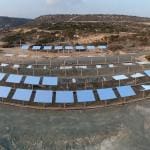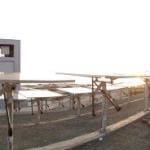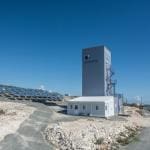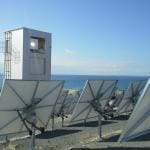Scientists from Australia’s CSIRO have designed and installed a solar thermal power plant with molten salt storage on the Mediterranean island of Cyprus.
The small, 150kW facility is being used to drive a desalination plant, but will also be used to test the CSIRO technology and explore further international opportunities.
The project is a joint venture with the Cyprus Institute, which is looking to deploy solar in the Middle East and Mediterranean islands to reduce dependence on oil and take advantage of their excellent solar resource.
“This project was a big step for CSIRO as it’s the first time we’ve deployed this cutting edge technology outside of our own backyard,” CSIRO solar research leader Wes Stein said.
The plant design is similar to a pilot facility in Newcastle, but includes smaller heliostats (mirrors) more suitable to the terrain in Cyprus. It has 50 heliostats and molten salt storage.
Professor Costas Papanicolas, President of the Cyprus Institute, said solar thermal technology had enormous potential for sun-rich countries such as Cyprus.
“Like Australia, Cyprus is blessed with an abundance of sunshine, so increasing the penetration of solar energy is an attractive option both in terms of energy affordability and lowering greenhouse gas emissions,” Professor Papanicolas said.
To satisfy European legislation, 13 per cent of Cyprus’ total energy consumption must be derived from renewable sources by 2020.
CSIRO said its solar thermal team at its energy centre in Newcastle have set a number of records in the past 12 months, generating pressurised air at 880°C and supercritical steam in research projects.
Thermal energy can also be stored relatively cheaply compared to other technologies, improving potential for large scale power generation regardless of when the sun is shining.
© 2015 Solar Choice Pty Ltd



